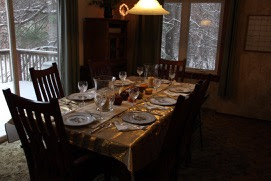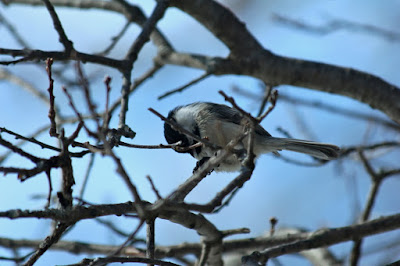After walking the dogs today, we're very thankful that we have a warm house that protects us from the wind and the windchill. We're thankful for the affection and company of those who share this house (and property) with us. We're thankful that we're more healthy than not, that there's food on the table and clothes on our backs, and that the vehicle in the garage is a major upgrade from our first car many, many years ago. Twice a year we had to hope it would pass inspection and were thankful when it did.
 |
| prepared to be thankful and full of hope
Photo by J. Harrington
|
We're thankful that, as much as they're being abused, the institutions in this country have maintained much of their resilience and, we hope, should be able to recover and/or be repaired when the current madness has exhausted itself. We are thankful that, several years ago, we read Rebecca Solnit's Hope in the Dark (first edition). Like Mr. Spock on Star Trek, Solnit offers a different, logical and irresistible perspective and how to survive, help each other, and, perhaps, even thrive in times like ours. She recently had an article published in the guardian that you should follow the link and read. Here's an example of why, she writes:
"Social, cultural or political change does not work in predictable ways or on predictable schedules. The month before the Berlin Wall fell, almost no one anticipated that the Soviet bloc was going to disintegrate all of a sudden (thanks to many factors, including the tremendous power of civil society, nonviolent direct action and hopeful organising going back to the 1970s), any more than anyone, even the participants, foresaw the impact that the Arab spring or Occupy Wall Street or a host of other great uprisings would have. We don’t know what is going to happen, or how, or when, and that very uncertainty is the space of hope."Her description of where hope lives and what it is leave no room for even a hair-splitting, nit-picker such as yr obt svt to find fault.
"Hope locates itself in the premises that we don’t know what will happen and that in the spaciousness of uncertainty is room to act. When you recognise uncertainty, you recognise that you may be able to influence the outcomes – you alone or you in concert with a few dozen or several million others. Hope is an embrace of the unknown and the unknowable, an alternative to the certainty of both optimists and pessimists. Optimists think it will all be fine without our involvement; pessimists adopt the opposite position; both excuse themselves from acting. It is the belief that what we do matters even though how and when it may matter, who and what it may impact, are not things we can know beforehand. We may not, in fact, know them afterwards either, but they matter all the same, and history is full of people whose influence was most powerful after they were gone."
 |
| "I hope there's a seed inside this shell!"
Photo by J. Harrington
|
If you find yourself in need of a source of hope more immediate than words, and you don't have a kitten, puppy or young child nearby, bundle up, head for nearby woods with some bird food, and watch chickadees for awhile. It's always worked for us. Hope often appears as insouciance, a key chickadee trait.
Of History and Hope
We have memorized America,how it was born and who we have been and where.In ceremonies and silence we say the words,telling the stories, singing the old songs.We like the places they take us. Mostly we do.The great and all the anonymous dead are there.We know the sound of all the sounds we brought.The rich taste of it is on our tongues.But where are we going to be, and why, and who?The disenfranchised dead want to know.We mean to be the people we meant to be,to keep on going where we meant to go.But how do we fashion the future? Who can say howexcept in the minds of those who will call it Now?The children. The children. And how does our garden grow?With waving hands—oh, rarely in a row—and flowering faces. And brambles, that we can no longer allow.Who were many people coming togethercannot become one people falling apart.Who dreamed for every child an even chancecannot let luck alone turn doorknobs or not.Whose law was never so much of the hand as the headcannot let chaos make its way to the heart.Who have seen learning struggle from teacher to childcannot let ignorance spread itself like rot.We know what we have done and what we have said,and how we have grown, degree by slow degree,believing ourselves toward all we have tried to become—just and compassionate, equal, able, and free.All this in the hands of children, eyes already seton a land we never can visit—it isn’t there yet—but looking through their eyes, we can seewhat our long gift to them may come to be.If we can truly remember, they will not forget.
********************************************
Thanks for visiting. Come again when you can.
Please be kind to each other while you can.
No comments:
Post a Comment